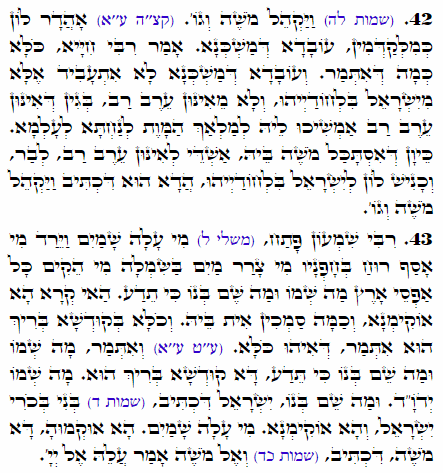Daily Zohar # 2385 – Vayakhel – How to have Shabbat every day
Daily Zohar 2385
Daily Zohar 2385

.
Hebrew translation:
43. רַבִּי שִׁמְעוֹן פָּתַח, (משלי ה) מִי עָלָה שָׁמַיִם וַיֵּרַד מִי אָסַף רוּחַ בְּחָפְנָיו מִי צָרַר מַיִם בַּשִּׂמְלָה מִי הֵקִים כָּל אַפְסֵי אָרֶץ מַה שְּׁמוֹ וּמַה שֶּׁם בְּנוֹ כִּי תֵדָע. פָּסוּק זֶה הֲרֵי בֵּאַרְנוּ, וְכַמָּה עַמּוּדִים יֵשׁ בּוֹ. וְהַכֹּל נֶאֱמַר עַל הַקָּדוֹשׁ בָּרוּךְ הוּא, שֶׁהוּא הַכֹּל. וְנֶאֱמַר, מַה שְּׁמוֹ וּמַה שֶּׁם בְּנוֹ כִּי תֵדָע – זֶה הַקָּדוֹשׁ בָּרוּךְ הוּא. מַה שְּׁמוֹ? יהו”ה. וּמַה שֶּׁם בְּנוֹ? יִשְׂרָאֵל, שֶׁכָּתוּב (שמות ד) בְּנִי בְכֹרִי יִשְׂרָאֵל, וַהֲרֵי בֵּאַרְנוּ. מִי עָלָה שָׁמַיִם, הֲרֵי פֵּרְשׁוּהוּ, זֶה מֹשֶׁה, שֶׁכָּתוּב (שם כד) וְאֶל מֹשֶׁה אָמַר עֲלֵה אֶת ה’.
.
Zohar Vayakhel
In the portion of Terumah we read that Moses asked from ‘every man’ to raise a donation for the building of the tabernacle.
Exodus 25:2
“דַּבֵּר אֶל-בְּנֵי יִשְׂרָאֵל, וְיִקְחוּ-לִי תְּרוּמָה: מֵאֵת כָּל-אִישׁ אֲשֶׁר יִדְּבֶנּוּ לִבּוֹ, תִּקְחוּ אֶת-תְּרוּמָתִי.”
“Tell the sons of Israel to raise a contribution for Me; from every man whose heart moves him you shall raise My contribution.“
The Erev Rav made the sin of the Golden Calf that drew the angel of death to come to the world. When Moses saw that, he separated the Erev Rav and gathered only the Israelites, asking them to support the building of the Holy Tabernacle.
Exodus 35:5
“וַיֹּאמֶר מֹשֶׁה, אֶל-כָּל-עֲדַת בְּנֵי-יִשְׂרָאֵל לֵאמֹר: זֶה הַדָּבָר, אֲשֶׁר-צִוָּה יְהוָה לֵאמֹר.”
“קְחוּ מֵאִתְּכֶם תְּרוּמָה, לַיהוָה, כֹּל נְדִיב לִבּוֹ, יְבִיאֶהָ אֵת תְּרוּמַת יְהוָה: זָהָב וָכֶסֶף, וּנְחֹשֶׁת”
“Moses spoke to all the congregation of the sons of Israel, saying, “This is the thing which the LORD has commanded, saying,”
“’Take from among you a contribution to YHVH; whoever is of a willing heart, let him bring it as YHVH’S contribution: gold, silver, and bronze,”
After the sin of the Golden Calf, Moses pleaded to God to save the Israelites and in Vayakhel he repeated the description of the Tabernacle because it he was addressing on the congregation of Israel.
In Ki Tisa, before the sin, the instruction of the Tabernacle followed by the instruction about sanctifying the Shabbat that makes us holy (Exodus 31:13).
In Vayakhel Moses gathered the people and started by telling them about the importance of Shabbat before asking them to donate for the building of the Tabernacle.
Commentaries explain that the first tabernacle was a gift from God giving the Israelite closer connection to him. The second one was given with mercy because of Moses’s plea. To benefit from the second tabernacle we need to work six days. This work represents the process of spiritual connection from Yessod to Chessed and draw the light of Binah to the seventh, which is Malchut and the aspect of Shabbat. Our lives are a continuous process of work to earn the light of ‘rest’, Shabbat.
Rabbi Shimon was called ‘Shabbat’ because he was continuously connected to Binah. It’s a state of complete affinity with the Light that gave him complete control over heaven (angels, life force) and earth (corporeal existence).
Many times we receive gifts that we don’t appreciate immediately and later we need to work hard to earn it. To see the gifts in our lives we should have a stronger connection to Shabbat. It’s not only the seventh day of the week and the opportunity to connect to the Torah. The Zohar is also the aspect of Shabbat that reveals the light of the Torah each time we study it.
We are all blessed for having the Zohar in our lives and easy access online to ‘work’ six days and study Zohar to earn the ‘Shabbat’. Appreciate the gifts of Zohar studies to earn its light. Allocate regular times everyday to study the Daily Zohar and or any other Zohar sources that teach the Torah from the Zohar. It would be better to have even a regular spot that would serve like a mini ‘tabernacle’ for your individual studies and connection. It could be 10 minutes or more as your time allowed but a daily ‘work’ is very important and beneficial.
{||}

 Previous: Vayakhel
Previous: Vayakhel

